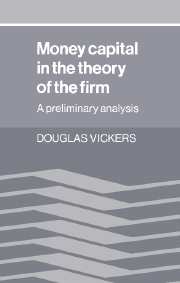Book contents
12 - Uncertainty and decisions in the firm
Published online by Cambridge University Press: 18 September 2009
Summary
The analytical issues of time and uncertainty have been relevant to many parts of our exposition. They throw an important light on many aspects of sequential decision making in the firm. In the traditional development of our subject, the assumptions that have been made in order to render the problems of time and uncertainty tractable have been related to the notion of equilibrium and equilibrium theorizing. In this chapter we shall reexamine a number of the interrelations that exist between these issues, and we shall bring into focus again a number of the questions that were raised in this connection in Chapter 1.
The theory of the firm has all too often been cast in a timeless, static, certainty, or certainty-equivalent mold. The capitulation of economics to the analytical priorities of general equilibrium theory has left the theory of the firm preoccupied with the description of equilibrium states of affairs. This has become paramount so far as our principal object in this book is concerned, namely the analysis of the firm's employment of money capital. Money capital costs have been conceptualized by the theory as definable by the rates of return that investors require on risky assets when equilibrium conditions are satisfied in the financial asset markets. We have suggested, on the other hand, ways of envisioning the money capital problem from the perspective of partial equilibrium and imperfect market theory.
- Type
- Chapter
- Information
- Money Capital in the Theory of the FirmA Preliminary Analysis, pp. 212 - 231Publisher: Cambridge University PressPrint publication year: 1987



